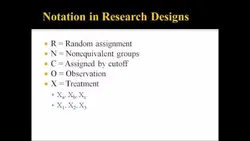
Research Methods in Counseling 
This course provides an overview of research methods in counseling, including research designs, independent and dependent variables, moderator and mediator variables, internal and external validity, levels of measurement, statistical significance, effect size, error, quantitative and qualitative research, testing the null hypothesis, between-subjects and within-subjects designs, writing a literature review, descriptive and inferential statistics, parametric and nonparametric tests, the Hawthorne effect, misattribution of arousal, the Dunning-Kruger effect, the Macdonald triad, primal therapy, bias in research, the placebo effect, probability values, television viewing, dialectical behavior therapy, the schizophrenogenic mother, repressed memories, sublimation, epidemiology, etiology, risk factors, nonverbal communication, the 93% - 7% rule, subliminal messages, and lie detectors. ▼
ADVERTISEMENT
Course Feature
![]() Cost:
Cost:
Free
![]() Provider:
Provider:
Youtube
![]() Certificate:
Certificate:
Paid Certification
![]() Language:
Language:
English
![]() Start Date:
Start Date:
On-Demand
Course Overview
❗The content presented here is sourced directly from Youtube platform. For comprehensive course details, including enrollment information, simply click on the 'Go to class' link on our website.
Updated in [May 25th, 2023]
What does this course tell?
(Please note that the following overview content is from the original platform)
Research Designs in Counseling.
Independent and Dependent Variables and Covariates.
Moderator and Mediator Variables.
Internal and External Validity.
Structuring and Writing the Method Section for an APA Style Manuscript.
Levels of Measurement in Statistics (Nominal, Ordinal, Interval, Ratio).
Statistical Significance, Effect Size, Error.
Quantitative and Qualitative Research.
Testing the Null Hypothesis in Counseling Research.
Between-Subjects and Within-Subjects Designs in Counseling Research.
Writing a Literature Review in Counseling Research.
Descriptive and Inferential Statistics in Counseling Research.
Parametric and Nonparametric Statistical Tests.
Is the Hawthorne Effect a Myth?.
What is Misattribution of Arousal?.
What is the Dunning-Kruger Effect?.
Can Violence be Predicted with the Macdonald Triad? (Homocidal Triad).
Is Primal Therapy Effective?.
Bias in Research.
What is the Actual Probability that a Marriage Will End in Divorce?.
Is the Eye Movement Element of EMDR Effective?.
The Role of Science in Counseling.
What is the Placebo Effect?.
What is a Probability Value (p-value) in Inferential Statistics?.
Does Television Viewing Increase the Risk of Antisocial Personality Disorder?.
What is Dialectical Behavior Therapy (DBT)?.
What is the Schizophrenogenic Mother?.
What are Repressed Memories and are they real?.
What is Sublimation? (Freudian Defense Mechanism).
Epidemiology, Etiology, and Risk Factors in Mental Health.
Can Nonverbal Communication Reveal Deception?.
Is the 93% - 7% Rule of Nonverbal and Verbal Communication True?.
Do Subliminal Messages Affect Human Behavior?.
Do Lie Detectors (Polygraphs) Really Work?.
We consider the value of this course from multiple aspects, and finally summarize it for you from three aspects: personal skills, career development, and further study:
(Kindly be aware that our content is optimized by AI tools while also undergoing moderation carefully from our editorial staff.)
Research Methods in Counseling is a course designed to help learners understand the fundamentals of conducting research in the field of counseling. Learners will gain an understanding of research designs, independent and dependent variables, moderator and mediator variables, internal and external validity, and levels of measurement in statistics. They will also learn how to structure and write the method section for an APA style manuscript, as well as how to write a literature review in counseling research. Additionally, learners will gain an understanding of descriptive and inferential statistics, parametric and nonparametric statistical tests, the Hawthorne effect, misattribution of arousal, the Dunning-Kruger effect, the Macdonald triad, primal therapy, bias in research, the placebo effect, probability values, television viewing and antisocial personality disorder, dialectical behavior therapy, the schizophrenogenic mother, repressed memories, sublimation, epidemiology, etiology, and risk factors in mental health, nonverbal communication and deception, the 93% - 7% rule of nonverbal and verbal communication, subliminal messages, and lie detectors. This course will provide learners with the necessary skills to conduct research in the field of counseling and to understand the implications of their findings.
[Applications]
After completing this course, students should be able to apply the research methods learned to their own counseling research. They should be able to identify independent and dependent variables, understand the importance of internal and external validity, and be able to structure and write the method section for an APA style manuscript. Additionally, they should be able to identify levels of measurement in statistics, understand the concept of statistical significance, and be able to differentiate between quantitative and qualitative research. Furthermore, they should be able to test the null hypothesis in counseling research, understand the Hawthorne effect, the Dunning-Kruger effect, and the Macdonald triad, and be able to evaluate the effectiveness of Primal Therapy. They should also be able to identify bias in research, understand the placebo effect, and be able to calculate probability values in inferential statistics. Finally, they should be able to evaluate the role of television viewing in antisocial personality disorder, understand dialectical behavior therapy, the schizophrenogenic mother, repressed memories, and sublimation, and be able to identify epidemiology, etiology, and risk factors in mental health. They should also be able to evaluate nonverbal communication for deception, understand the 93% - 7% rule of nonverbal and verbal communication, evaluate the effectiveness of subliminal messages, and be able to assess the accuracy of lie detectors (polygraphs).
[Career Paths]
1. Research Psychologist: Research psychologists use research methods to study human behavior and mental processes. They use a variety of techniques, such as surveys, interviews, and experiments, to collect data and analyze it. They may also use statistical methods to draw conclusions from the data. The development of new technologies and the increasing availability of data are driving the demand for research psychologists.
2. Clinical Psychologist: Clinical psychologists use research methods to diagnose and treat mental health issues. They use a variety of techniques, such as psychotherapy, cognitive-behavioral therapy, and psychopharmacology, to help patients manage their mental health. The increasing prevalence of mental health issues is driving the demand for clinical psychologists.
3. Counseling Psychologist: Counseling psychologists use research methods to help individuals, couples, and families cope with mental health issues. They use a variety of techniques, such as psychotherapy, cognitive-behavioral therapy, and family therapy, to help patients manage their mental health. The increasing prevalence of mental health issues is driving the demand for counseling psychologists.
4. Neuropsychologist: Neuropsychologists use research methods to study the relationship between the brain and behavior. They use a variety of techniques, such as brain imaging, neuropsychological tests, and neuropsychological assessments, to study the brain and its effects on behavior. The development of new technologies and the increasing availability of data are driving the demand for neuropsychologists.
Course Provider

Provider Youtube's Stats at AZClass
Over 100+ Best Educational YouTube Channels in 2023.
Best educational YouTube channels for college students, including Crash Course, Khan Academy, etc.
AZ Class hope that this free Youtube course can help your Counseling skills no matter in career or in further education. Even if you are only slightly interested, you can take Research Methods in Counseling course with confidence!
Discussion and Reviews
0.0 (Based on 0 reviews)
Explore Similar Online Courses

Complete Guide To Amazon Kindle Self-Publish - Start KDP With No Costs

Canva Graphics Design Essential Training For Everyone (11 Projects)

Python for Informatics: Exploring Information

Social Network Analysis

Introduction to Systematic Review and Meta-Analysis

The Analytics Edge

DCO042 - Python For Informatics

Causal Diagrams: Draw Your Assumptions Before Your Conclusions

Whole genome sequencing of bacterial genomes - tools and applications

Use this PTSD Treatment Plan in Your Counseling Practice

Graphology Free Course: 7 Negative Handwriting Sign Types!


Start your review of Research Methods in Counseling